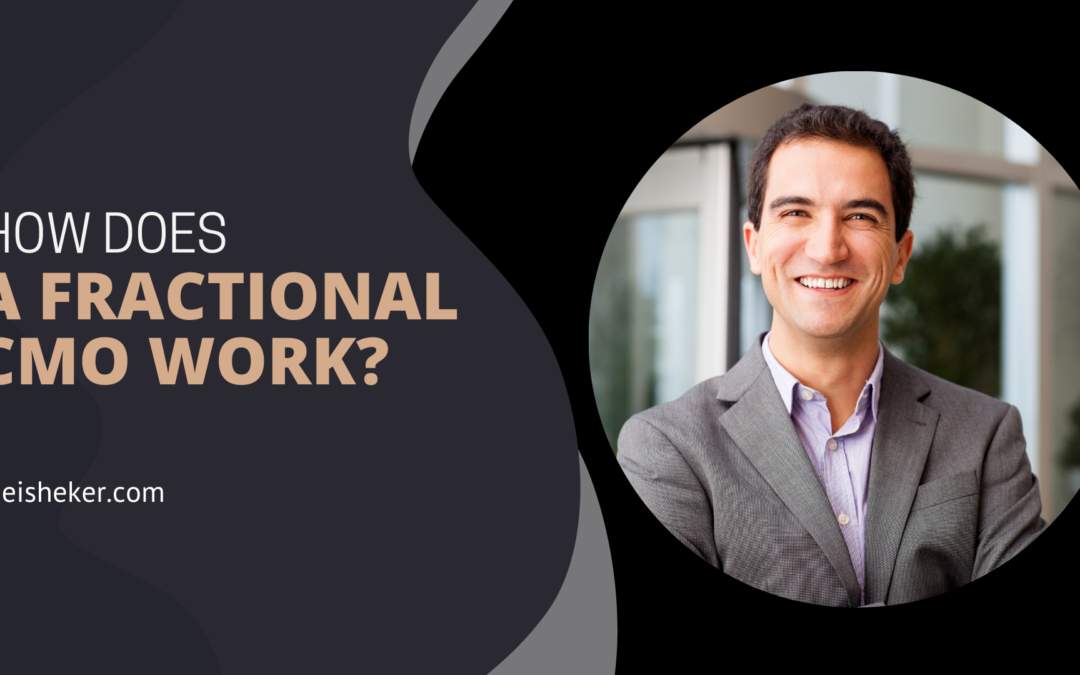How Does a Fractional CMO Work? Understanding the Role and Benefits
Have you ever heard of a fractional CMO? It might sound confusing, but it’s actually a pretty cool job in the world of marketing. In this article, we’re going to talk all about fractional CMOs – what they do, how they help businesses, and why some companies choose to hire them instead of full-time marketing leaders. Let’s dive in!
What is a Fractional CMO?
First things first, let’s break down what “fractional CMO” means. CMO stands for Chief Marketing Officer. This is usually a top-level job in a company, where someone is in charge of all the marketing stuff. The “fractional” part means that this person doesn’t work full-time for just one company. Instead, they split their time between different businesses.
Think of it like sharing a pizza. If you have a whole pizza to yourself, that’s like a full-time CMO who only works for one company. But if you share that pizza with friends, each person gets a “fraction” or a piece of the pizza. That’s how a fractional CMO works – they share their time and skills with different companies.
What Does a Fractional CMO Do?
Now that we know what a fractional CMO is, let’s talk about what they actually do. Their main job is to help companies with their marketing. This can mean a lot of different things, because marketing is a big area. Here are some of the main things a fractional CMO might do:
- Make marketing plans: They come up with ideas for how a company can tell people about their products or services.
- Look at data: They check numbers and information to see how well the marketing is working.
- Lead a team: Even though they’re not there full-time, they often guide the people who work on marketing every day.
- Talk to company leaders: They meet with bosses and owners to talk about how marketing can help the business grow.
- Keep up with new trends: They learn about new ways to do marketing, like using social media or new technology.
- Fix marketing problems: If something isn’t working well in the company’s marketing, they try to figure out why and fix it.
- Help save money: They look for ways to do good marketing without spending too much.
- Train people: They teach the marketing team new skills and ideas.
A Day in the Life of a Fractional CMO
You might be wondering what a fractional CMO does every day. Well, their days can be pretty different because they work with more than one company. But here’s an idea of what a typical day might look like:
Morning:
- Check emails and messages from different clients (the companies they work for)
- Join a video call with one company to talk about their new product launch
- Look at some marketing reports to see how things are going
- Write some ideas for a new marketing campaign
Afternoon:
- Have lunch (everyone needs a break!)
- Meet with another company’s team to teach them about social media marketing
- Work on a plan to help a company fix a problem with their website
- Answer questions from marketing team members at different companies
Evening:
- Finish up any leftover work
- Plan for the next day
- Maybe do some reading to learn about new marketing ideas
Remember, this is just an example. Every day can be different, which is one reason why many people like being a fractional CMO!
Weekly and Monthly Tasks
A fractional CMO also has things they do every week or every month. Here are some examples:
Weekly:
- Check in with each company they work for
- Look at how well marketing efforts are doing
- Have team meetings to make sure everyone knows what to do
- Plan content for social media and other marketing
Monthly:
- Make reports to show how marketing is helping each company
- Meet with company leaders to talk about big picture stuff
- Plan for the next month
- Look for new ways to help the companies grow
The Benefits of Hiring a Fractional CMO
Now, you might be thinking, “Why would a company want to hire someone part-time instead of full-time?” That’s a great question! There are actually quite a few reasons why a fractional CMO can be a good choice. Let’s look at some of the benefits:
- Save Money: Hiring a full-time CMO can cost a lot of money. They usually get paid a lot because it’s a big job. But with a fractional CMO, a company only pays for the time they actually need. It’s like renting a fancy car when you need it instead of buying one.
- Get an Expert: Fractional CMOs often have worked with lots of different companies. This means they have tons of experience and know about many different ways to do marketing. They can bring all this knowledge to help a company.
- Fresh Ideas: Because fractional CMOs work with different companies, they often have new and exciting ideas. They can see things in a different way than someone who only works at one place.
- Flexibility: Sometimes a company doesn’t need a CMO all the time. Maybe they just need extra help for a few months or for a big project. A fractional CMO gives them the flexibility to get help when they need it.
- Quick Start: Hiring a full-time CMO can take a long time. Companies have to search for the right person, do interviews, and then wait for them to start. A fractional CMO can often start helping right away.
- No Long-Term Commitment: If a company hires a full-time CMO and it doesn’t work out, it can be hard to make a change. With a fractional CMO, it’s easier to try it out and see if it’s a good fit.
- Access to a Network: Fractional CMOs often know lots of other marketing experts. They can help a company find other people to help with specific tasks if needed.
- Focus on Results: Because fractional CMOs usually work on shorter contracts, they’re really focused on getting good results quickly. They want to show that they’re helping the company so they’ll be hired again.
What Should Companies Expect When Hiring a Fractional CMO?
When a company hires a fractional CMO, they might wonder what to expect. Here are some things that the leaders of the company and the board of directors (the group of people who help make big decisions for the company) should keep in mind:
- Part-Time Help: Remember, a fractional CMO isn’t there all the time. They might work a certain number of days each week or month. The company needs to be okay with this arrangement.
- Strategic Thinking: A good fractional CMO should help the company think about big-picture marketing ideas. They’re not just there to do day-to-day tasks.
- Guidance, Not Always Hands-On Work: While a fractional CMO might do some hands-on work, their main job is usually to guide the marketing team and come up with plans. The regular employees or other helpers usually do most of the everyday work.
- Communication: Even though they’re not there full-time, a fractional CMO should keep in touch regularly. They should let the company know what they’re working on and how things are going.
- Measurable Results: The company should expect to see clear results from the fractional CMO’s work. This might be things like more people buying products, more visitors to the website, or better brand recognition.
- Industry Knowledge: A fractional CMO should learn about the company’s industry if they don’t already know about it. They should understand what makes the company special and what challenges it faces.
- Team Leadership: Even though they’re not there all the time, a fractional CMO should be able to lead and motivate the marketing team.
- Flexibility: Sometimes plans need to change. A good fractional CMO should be able to adjust their strategies if something isn’t working or if the company’s needs change.
What Can a Fractional CMO Really Do?
It’s important for companies to have realistic expectations about what a fractional CMO can accomplish. Here are some things to keep in mind:
- Time Frame: Big changes don’t happen overnight. It usually takes at least 3-6 months to start seeing significant results from new marketing efforts.
- Scope of Work: A fractional CMO can do a lot, but they can’t do everything. The company needs to be clear about what they want the CMO to focus on.
- Team Support: The fractional CMO will need help from the company’s employees to get things done. If the team is too small or doesn’t have the right skills, it might take longer to see results.
- Budget: Marketing often requires spending some money. The fractional CMO can come up with good ideas, but the company needs to be willing to invest in putting those ideas into action.
- Realistic Goals: It’s great to have big dreams, but it’s important to set realistic goals. A fractional CMO can help a company grow, but they can’t work miracles.
- Ongoing Process: Marketing isn’t a one-time thing. It’s an ongoing process that needs constant attention and adjustments.
Some examples of what a fractional CMO might accomplish in different time frames:
In 1-3 months:
- Analyze the current marketing efforts and identify areas for improvement
- Develop a new marketing strategy
- Set up systems for tracking marketing results
- Start implementing some quick wins, like improving social media presence
In 3-6 months:
- Launch new marketing campaigns
- Improve the company’s website
- Start seeing some improvements in marketing metrics, like more website visitors or more sales leads
In 6-12 months:
- See significant improvements in brand awareness
- Have a fully implemented marketing plan
- Show measurable results in terms of increased sales or customer growth
- Have a well-trained marketing team in place
Remember, these are just examples. Every company is different, and results can vary depending on many factors.
Wrapping It Up
Fractional CMOs are like marketing superheroes who swoop in to help companies when they need it. They bring lots of knowledge and experience, but they don’t need to be there all the time. This can be a great option for companies that want expert marketing help but can’t afford or don’t need a full-time CMO.
For companies thinking about hiring a fractional CMO, it’s important to have clear goals and realistic expectations. It’s also crucial to find someone who’s a good fit for the company’s culture and needs.
For people interested in becoming fractional CMOs, it’s a job that requires lots of skills. You need to know a lot about marketing, be good at working with different types of people and companies, and be able to juggle multiple projects at once.
Whether you’re a business owner considering hiring a fractional CMO or someone interested in this career path, understanding the role is the first step. Fractional CMOs play an important part in helping businesses grow and succeed in today’s fast-paced world of marketing.
So next time you hear someone talk about a fractional CMO, you’ll know exactly what they mean. You might even want to share your new knowledge – just remember to explain it’s like sharing a pizza!
Hire a Leading B2B SaaS Fractional CMO
If your company needs a B2B SaaS fractional CMO, consider working with Peter Geisheker. Peter has been providing Fractional CMO services for over 20 years and has expertise in growth tactics and conversion optimization. View Peter’s SaaS fractional CMO case studies.


